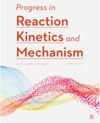Adsorption of P-Nitrophenol Onto Partially Reduced Graphene Oxide: An Experimental and Theoretical Study
IF 4.8
4区 化学
Q3 CHEMISTRY, PHYSICAL
Progress in Reaction Kinetics and Mechanism
Pub Date : 2018-06-01
DOI:10.3184/146867818X15233705894374
引用次数: 2
Abstract
This study investigated the adsorption process of p-nitrophenol (p-NP) onto partially reduced graphene oxide (prGO) using both experiment and theoretical calculations. The maximum adsorption capacity of prGO at pH 6.0 and 293 K for p-NP was 29.94 mg g−1 which was significantly higher than previously reported using a metal-doped reduced graphene oxide composite. Systematic, comparative theoretical calculations were used to investigate the adsorption mechanism of p-NP onto graphene oxide, prGO and graphene nanosheet (GN). Calculations revealed three types of adsorption site and indicated that the adsorption force and sites were significantly affected by the quantity and type of oxygen-containing functional groups on the GN. The adsorption affinity was mainly derived from hydrogen bonds and π-π stacking which was further demonstrated by FTIR analysis. Due to its excellent adsorption performance, good recyclability and easy separation, prGO can be a promising adsorbent for the efficient elimination of p-NP from wastewater in the future.部分还原氧化石墨烯吸附对硝基苯酚的实验与理论研究
本研究通过实验和理论计算研究了对硝基苯酚(p-NP)在部分还原氧化石墨烯(prGO)上的吸附过程。在pH 6.0和293 K条件下,prGO对p-NP的最大吸附量为29.94 mg g - 1,显著高于先前报道的金属掺杂还原氧化石墨烯复合材料。采用系统的、比较的理论计算研究了p-NP在氧化石墨烯、氧化石墨烯和石墨烯纳米片(GN)上的吸附机理。计算发现了三种类型的吸附位点,并表明吸附力和吸附位点受GN上含氧官能团数量和类型的显著影响。吸附亲合力主要来源于氢键和π-π堆积,FTIR分析进一步证实了这一点。由于其优异的吸附性能,良好的可回收性和易于分离,prGO有望成为未来有效去除废水中p-NP的吸附剂。
本文章由计算机程序翻译,如有差异,请以英文原文为准。
求助全文
约1分钟内获得全文
求助全文
来源期刊
CiteScore
2.10
自引率
0.00%
发文量
5
审稿时长
2.3 months
期刊介绍:
The journal covers the fields of kinetics and mechanisms of chemical processes in the gas phase and solution of both simple and complex systems.

 求助内容:
求助内容: 应助结果提醒方式:
应助结果提醒方式:


